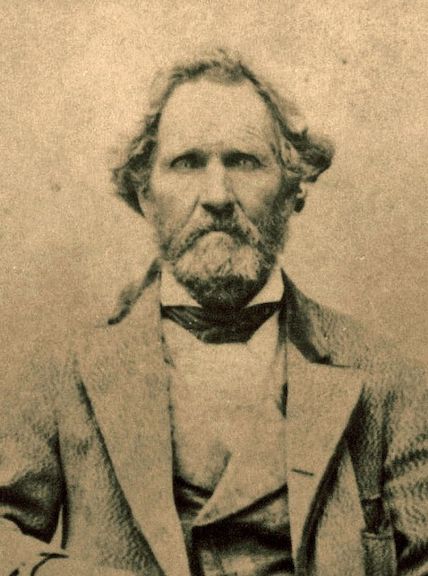Thomas Grover
Thomas Grover was an early leader in The Church of Jesus Christ of Latter-day Saints. He was one of the first pioneers to leave Nauvoo, Illinois, and served in the Utah Legislature.
Grover was born on July 22, 1807, in Whitehall, New York. He was twelve years old when he began working as a cabin boy on a barge on Lake Erie. Twelve years later, he became a captain on a freight and passenger vessel.
He was 21 when he married Caroline Whitmer. He gave up his life on the river and became a Methodist preacher. It wasn’t long, though, before he heard the message of the gospel of Jesus Christ, accepted it, and was baptized a member of The Church of Jesus Christ of Latter-day Saints by Warren A. Cowdery in 1834. In 1835, he sold his property and moved to Kirtland.
“Thomas was greeted in Kirtland by the Prophet Joseph, who said, “If ever God sent a man he sent you. I want every dollar … that you have got in the world.” Without hesitation, Thomas turned over to the Prophet his money from the sale of his property in New York. The money was used to purchase building materials for the Kirtland Temple.”[1]
In 1837, he moved his family to Far West, Missouri. Two years later he supervised the removal of the Saints from Missouri.[2] Later that year he moved to Nauvoo.
His wife became ill and died on October 17, 1840. That same month their infant daughter died. Grover served three missions from 1840 to 1844 to Michigan, New York, and southern Canada. In June 1844 he was impressed in a dream to return to Nauvoo, and arrived at Carthage, Illinois, in time to escort the bodies of slain Joseph and Hyrum to Nauvoo.[3]
In February 1841, he married Caroline Nickerson Hubbard.
Grover was among the first members of the Church to leave Nauvoo. While crossing the Mississippi River, he lost most of his possessions. Brigham Young explained, “A filthy wicked man squirted some tobacco juice into the eyes of one of the oxen attached to Thomas Grover’s wagon, which immediately plunged into the river, dragging another ox with him, and as he was going overboard he tore off one of the side boards which caused the water to flow into the flatboat.”
Grover was a captain in Brigham Young’s vanguard company. At the Platte River, Grover constructed and managed a ferry service that was used by numerous emigrants. He stayed there until the waters of the Platte lowered enough for wagons to ford the river in shallow places. He entered the Salt Lake Valley in Charles C. Rich's company. He arrived in the Salt Lake Valley on October 2, 1847.
Soon after he settled his family in Davis County, Utah Territory, “Brigham Young asked him to go to northern California to settle some disturbances that had arisen among the Saints in that area and collect their tithing. Not only did Thomas accomplish this, he joined with miners in searching for gold. When he returned to his family in the Salt Lake Valley, he was carrying with him over a hundred pounds of gold. According to his posterity, he gave in gold five hundred dollars towards the construction of the Salt Lake Temple.”[4]
Grover served three terms in the Utah Territory legislature representing Davis County. He was also a probate judge.
He practiced plural marriage and had eight wives and 52 children, although 23 of those children died in childhood.
In the spring of 1850, Grover with a couple of his boys and his wife Hannah, went back to Iowa to buy cattle. They remained there until the early summer of 1853. They returned to the Salt Lake Valley in the late summer of 1853 bringing 150 cows with them.
Grover served in the Church high councils in Kirtland, Ohio; Far West, Missouri; Nauvoo, Illinois; Cutler’s Park, Nebraska; and Salt Lake City and Farmington, Utah. He served as a missionary to the Eastern States in 1874-75.
He died on February 20, 1886, in Farmington at age 78.
